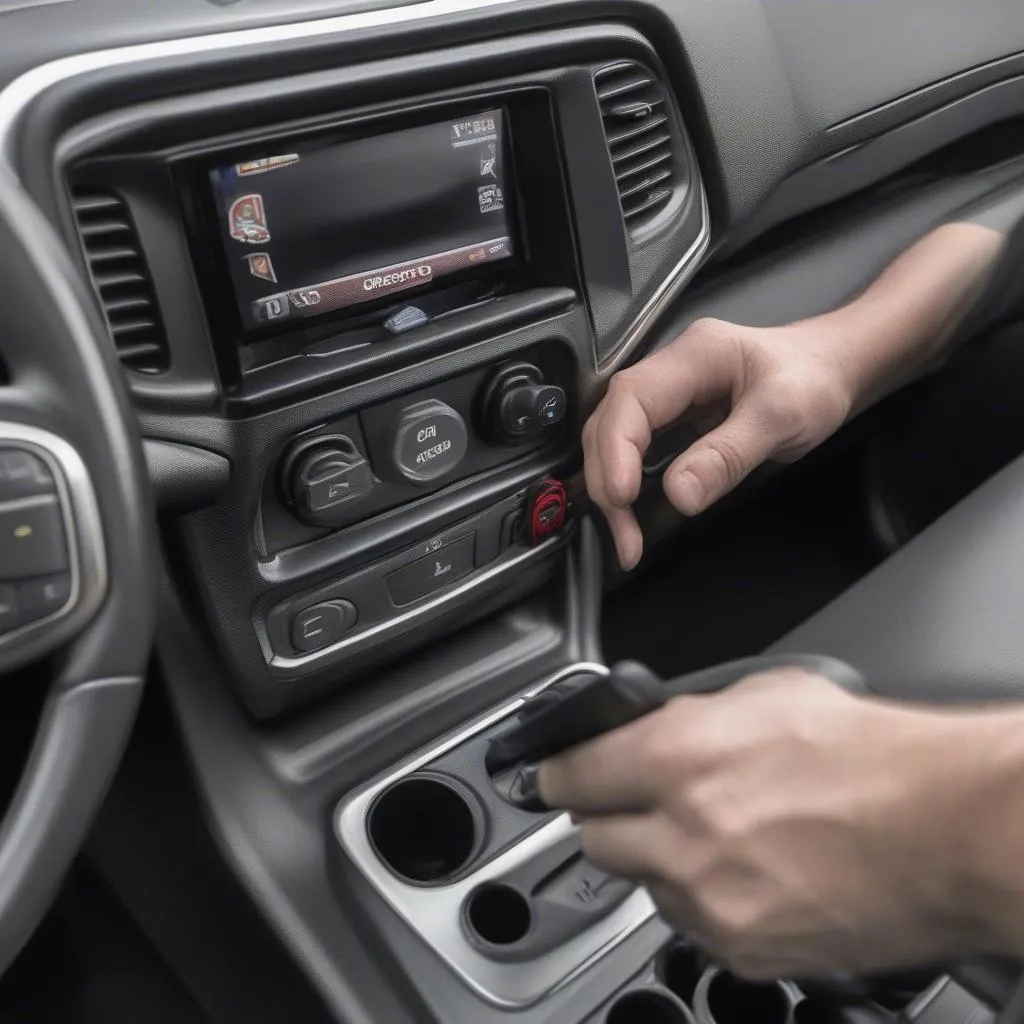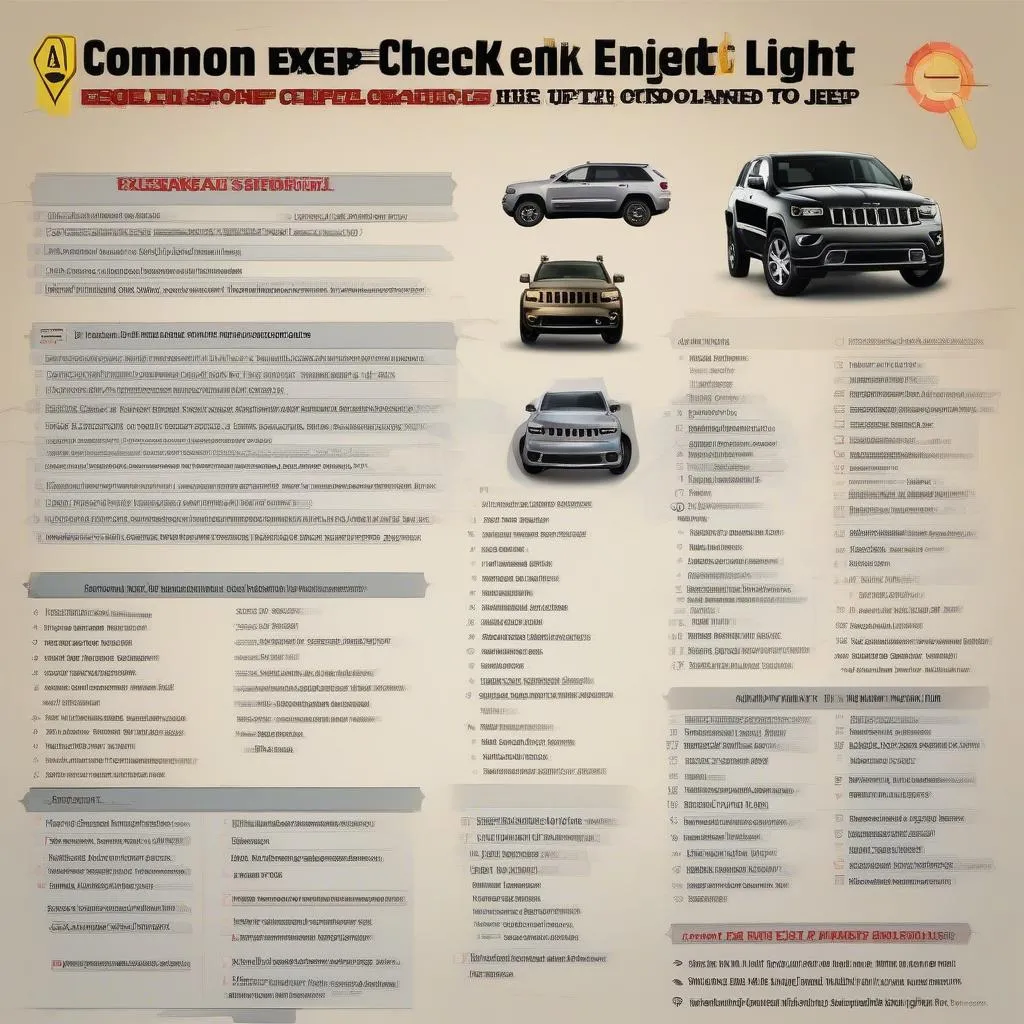Imagine this: You’re on a road trip across the American Southwest, cruising along Route 66 in your trusty Jeep Grand Cherokee, when suddenly, your engine light flickers on. You pull over to the side of the road, hoping it’s just a minor issue. But when you try to restart the engine, it sputters and dies. You’re stranded, miles away from the nearest dealership.
This scenario might sound frustrating, but it’s a common experience for Jeep Grand Cherokee owners, especially those who rely on a Dealer Scanner for diagnostics. Dealer Scanners, like those used by dealerships, are powerful tools, but they can be expensive and often inaccessible to everyday mechanics.
Understanding the Need for a Workaround
The problem lies in the advanced electronics of modern vehicles, like the Jeep Grand Cherokee. These vehicles use complex networks of sensors and control modules that communicate with each other through a digital language. To understand the root cause of an issue, mechanics need to access and interpret this data, which is where a specialized scan tool comes in.
From a repair specialist’s perspective, access to dealer-level diagnostics is crucial for troubleshooting complex engine, transmission, and electrical problems. These tools allow for comprehensive analysis of fault codes, real-time data monitoring, and even reprogramming control modules. From a technical standpoint, modern vehicles rely heavily on intricate computer systems that require specific software and hardware for accurate diagnosis.
From an economic perspective, the absence of a dealer scanner can lead to longer repair times, increased diagnostic costs, and potentially unnecessary replacements of parts. This is where workaround procedures become invaluable, providing a cost-effective and accessible solution for car owners facing troubleshooting challenges.
The Jeep Grand Cherokee Scan Tool Workaround Procedure
Fortunately, there are a few tried-and-true methods for troubleshooting your Jeep Grand Cherokee even without a dedicated dealer scanner.
1. Basic OBD2 Scanner: Every Jeep Grand Cherokee, even older models, is equipped with an OBD2 port, which is a standardized connector used for diagnostics. You can purchase a basic OBD2 scanner online or at most auto parts stores for a reasonable price.
2. Third-Party Scan Tools: While not as comprehensive as a dealer scanner, many third-party scan tools offer advanced capabilities, including access to live data streams, code reading, and even limited reprogramming options. For instance, the “Autoboss V30” scan tool, available on popular online marketplaces, provides a robust alternative to dealer scanners for many popular European car models, including the Jeep Grand Cherokee.
3. Troubleshooting Charts and Guides: Numerous online resources, including manufacturer websites and repair manuals, offer troubleshooting charts and guides that can help you identify potential problems based on symptoms.
4. Check Engine Light Codes: Using your OBD2 scanner, you can access and decode the check engine light codes, which provide valuable information about potential issues. These codes can be interpreted using online code libraries or through user manuals for specific models.
5. Visual Inspection: While not a substitute for advanced diagnostics, a visual inspection of your engine bay, hoses, and electrical connections can help identify common problems, such as loose wires, fluid leaks, or faulty components.
6. Resourceful Online Communities: Forums and online communities dedicated to Jeep Grand Cherokee enthusiasts offer a wealth of knowledge, troubleshooting tips, and real-world experiences. You can often find valuable insights and solutions from fellow Jeep owners who have faced similar problems.
 Jeep Grand Cherokee OBD2 Port Location
Jeep Grand Cherokee OBD2 Port Location
Common Jeep Grand Cherokee Problems and Their Workarounds
While the Jeep Grand Cherokee is known for its reliability, certain issues can arise. These are some of the most common problems and their potential workarounds:
1. Check Engine Light with “P0300” Code: This code usually indicates a random misfire in the engine.
Workaround:
- Inspect spark plugs and wires: Ensure they are properly connected and not damaged.
- Check the fuel system: Verify fuel pressure and look for any leaks or restrictions in the fuel lines.
- Test the ignition coil: Use a multimeter to measure the resistance of the ignition coil and replace it if necessary.
2. Transmission Problems:
Workaround:
- Check transmission fluid level: Ensure the fluid is full and clean.
- Inspect transmission lines: Look for leaks or damage.
- Use a transmission fluid flush: This can help remove debris and improve performance.
3. Electrical Issues:
Workaround:
- Inspect fuse box: Check for blown fuses and replace them if necessary.
- Test the battery: Ensure the battery is charged and in good condition.
- Look for damaged wiring: Inspect for chafed wires, loose connections, and corroded terminals.
4. ABS System Errors:
Workaround:
- Check ABS sensors: Ensure they are clean and free of debris.
- Verify ABS fuse: Check the fuse for the ABS system.
- Inspect wiring to ABS module: Look for damage or corrosion.
 Jeep Grand Cherokee Check Engine Light Codes Explained
Jeep Grand Cherokee Check Engine Light Codes Explained
Frequently Asked Questions
Q: What are the best third-party scan tools for the Jeep Grand Cherokee?
A: Some popular and highly rated third-party scan tools for the Jeep Grand Cherokee include the Autel MaxiCOM MK808, Launch X431 PRO, and the Innova 5610. These tools offer advanced features and compatibility with a wide range of Jeep models.
Q: Can I use a smartphone app to diagnose my Jeep Grand Cherokee?
A: While some smartphone apps offer basic OBD2 functionality, they often lack the advanced capabilities of dedicated scan tools. For more complex issues, a dedicated scan tool is still recommended.
Q: Can I reset the check engine light myself?
A: Yes, you can usually reset the check engine light by using your OBD2 scanner. However, it’s important to remember that this only resets the light and does not address the underlying issue. You should address the problem that caused the light to come on in the first place.
Conclusion
While a dealer scanner is the ideal tool for Jeep Grand Cherokee diagnostics, it’s not always accessible or affordable. By implementing these workaround procedures, you can gain valuable insight into your vehicle’s health and troubleshoot many common problems effectively. Remember to always consult your owner’s manual and seek professional assistance if you encounter complex issues or feel unsure about proceeding.
Don’t hesitate to contact us at +84767531508 if you have any questions about Jeep Grand Cherokee diagnostics, scan tools, or need help with any automotive repair challenges. Our team of experts is here to help you get back on the road safely and confidently.


